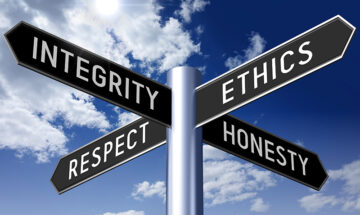Articles

All You Have Is Your Integrity: Why Leave Your Business Ethics to Chance?
Everyone knows right from wrong. Right? Wrong. People disagree about the definition of right and wrong all of the time. That is why the topic of business ethics is often found front and center in the media and in office break rooms.
Common sense, which you may consider a driver of integrity—isn’t that common either—or so the saying goes. What you may think is right another person feels is wrong, and it is challenging to reach an agreement. This is why ethical business behavior isn’t something that comes obviously to everyone. You may need to teach people about integrity.
And, as our world becomes more complex, sometimes the right answer, the one that meets the needs of the most stakeholders: employees, customers, potential employees, shareholders, and board members, lies somewhere in the middle. When you operate globally, you may find people in different countries have different ideas about what is essential, too.
Business Ethics Challenges
Think about these business ethics scenarios that happen in organizations every day.
- An employee surfs the Internet shopping for personal items on company time.
- A plant manager decides to ship a product to a customer even though they know the parts have a quality problem because the problem doesn’t affect the part function and the customer probably won’t notice.
- An employee spends several hours a week on their cell phone talking with their children and associated caregivers, schools, and friends.
- A salesman marks parts as sold in the company database, thus depriving others of the ability to sell the parts, even though his or her sale is uncertain.
- A manager shares important company information with a competitor for potential gain.
- A store misrepresents the quality or functionality of an advertised sale item.
- An employee takes office supplies home to stock their home office.
- A finance officer accounts questionably for purchases and expenditures.
- An accountant tells a supplier that their “check is in the mail” when they know that the check has not yet been written.
Every business encounters these situations and similar ones. You need to make sure your business standards are clear.
Do employees even consider whether the choices they are making are ethical? Employees can rationalize behavior—it’s just a pen, it’s okay if I take it home. Or, I work hard, so it’s okay if I spend an hour on the internet. Or, I’m underpaid, so it’s okay if I fudge my time card to get a bit of overtime pay. They may not consider these as bad choices—as they can justify why they do what they do.
So, before you relegate the subject of business ethics to the touchy-feely, head-in-the-clouds worlds of philosophy, religion, or academia, consider the potential positive impact on your organization of a working code of business ethics.
Why Develop a Code of Business Ethics?
You can develop a written code of business ethics that guides all of your stakeholders’ decision-making and actions. Your reputation and track record for ethical behavior and integrity are vital for establishing the trust that is the basis for all successful relationships you sustain, including those with your customers, employees, community, and your stockholders. Why would you leave something this important to chance?
The most crucial part of getting your staff to behave ethically is ensuring that the senior team behaves ethically. If the VP asks the warehouse manager to write off products that he’s taking for his own use, you can bet that all of the warehouse employees will think that a little stealing is okay. If the head of marketing approves a campaign that describes the product as better than it is, the staff learns that a little lying is okay. Senior leaders must walk their talk.
Your senior leaders must commit to developing the business ethics code and leading its implementation. They must continuously emphasize the use of the business code of ethics as a measurement or guideline for judging ethical behavior in your organization. HR or organization development professionals cannot effectively lead this effort but can support the senior leaders as a member of the leadership team.
Developing a code of business ethics will not stop unethical behavior, but it will give people something to think about, a measurement against which to assess their behavior.
Develop a Code of Business Ethics
In an article about how to make values live in your organization, a process was detailed on how to engage and involve much of your workforce in developing organizational values and value statements. If you incorporated the value statements into your strategic planning process, you have already developed the foundation of your code of business ethics. If not, the described process will also work well for developing a code of business ethics that your employees will support.
As with each of these strategic initiatives, a large part of the value comes from employees talking about and identifying how to address key issues related to customers, fellow employees, and the organization. The end document is gravy assuming it is used regularly in your organization.
Institutionalize Your Code of Business Ethics
Once you have developed your code of business ethics, the critical component in making it an effective tool is using the code, daily, if possible.
Carter McNamara of Authenticity Consulting, at his excellent resource about business ethics, tells this story.
“If you are planning to infuse strong, ethical principles like integrity throughout your company or want to change the culture of your company, then you might take the advice of Bob Kniffin, Vice President of External Affairs (later spokesperson), at Johnson and Johnson (J&J) company.
Business Ethics and Integrity at J&J
The way that J&J handled an ethical issue (the “Tylenol scare” crisis) in the 1980s is one of the most inspiring and enlightening examples ever demonstrated of how to successfully deal with a major ethical issue in business. Kniffin was one of the key players in helping J&J to handle the crisis so effectively.
“Kniffin said that it was not the J&J Credo (a form of a business code of ethics) that helped J&J to handle the crisis so well. Rather, it was the ongoing ‘challenge sessions’ that the company regularly held in order for each person to clarify their own perspective and commitment to the J&J Credo.”
For those of you who may not remember, J&J managers immediately removed Tylenol from the market and stopped all production of the product after seven Chicago residents died after ingesting cyanide-laced capsules.
Despite different advice from consultants and lawyers who said they would ruin the J&J brand forever, these managers lived their code of business ethics. They made these decisions while their company CEO was on a plane trip. By the time he landed, the entire process was underway.
Make your code of ethics live in your organization by organizing your own challenge sessions. Use the business code of ethics document as a measurement or guideline for all actions and decisions in your company. Your reputation and integrity are too important to leave to chance.

